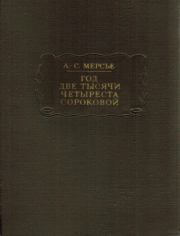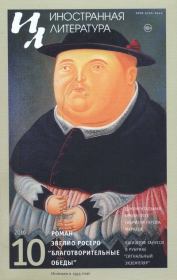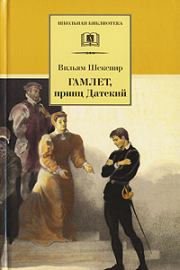Уильям Шекспир , Хилари Мантел , Александр Константинович Жолковский , Кеннет Брана , Хаим Плуцик - Год Шекспира
 | Название: | Год Шекспира |
Автор: | Уильям Шекспир , Хилари Мантел , Александр Константинович Жолковский , Кеннет Брана , Хаим Плуцик | |
Жанр: | Классическая проза, Поэзия, Критика | |
Изадано в серии: | Иностранная литература, 2016 № 10 | |
Издательство: | Иностранная литература | |
Год издания: | 2016 | |
ISBN: | неизвестно | |
Отзывы: | Комментировать | |
Рейтинг: | ||
Поделись книгой с друзьями! Помощь сайту: донат на оплату сервера | ||
Краткое содержание книги "Год Шекспира"
Далее — очередной выпуск рубрики «Год Шекспира».
Рубрике задает тон трогательное и торжественное «Письмо Шекспиру» английской писательницы Хилари Мантел в переводе Тамары Казавчинской. Затем — новый перевод «Венеры и Адониса». Свою русскоязычную версию знаменитой поэмы предлагает вниманию читателей поэт Виктор Куллэ (1962). А филолог и прозаик Александр Жолковский (1937) пробует подобрать ключи к «Гамлету». Здесь же — интервью с английским актером, режиссером и театральным деятелем Кеннетом Браной (1960), известным постановкой «Гамлета» и многих других шекспировских пьес. Перевод Елены Малышевой. Завершает рубрику — глава из поэмы американского поэта Хаима Плуцика (1911–1962) «Горацио» в переводе Антона Нестерова. Вот что он пишет, среди прочего, в своем предисловии: «…в глазах датского двора и народа Дании Гамлет — всего лишь убийца законного властителя, а история, рассказанная Призраком, никому, кроме принца и Горацио, не известна. Свидетельство Горацио — последнее и единственное оправдание принца. И на этом Плуцик строит свою поэму».
Читаем онлайн "Год Шекспира". [Страница - 3]
- 1
- 2
- 3
- 4
- 5
- . . .
- последняя (22) »
O’er-worn, despisèd, rheumatic, and cold,
Thick-sighted, barren, lean, and lacking juice;
Then mightst thou pause, for then I were not for thee,
But having no defects, why dost abhor me?
ʼThou canst not see one winkle in my brow,
Mine eyes are grey, and bright, and quick in turning.
My beauty as the spring doth yearly grow,
My flesh is soft, and plump, my marrow burning.
My smooth moist hand, were it with thy hand felt,
Would in thy palm dissolve, or seem to melt.
ʼBid me discourse, I will enchant thine ear,
Or like a fairy trip upon the green,
Or like a nymph, with long dishevelled hair,
Dance on the sands, and yet no footing seen.
Love is a spirit all compact of fire,
Not gross to sink, but light, and will aspire.
ʼWitness this primrose bank whereon I lie:
These forceless flowers like sturdy trees support me;
Two strengthless doves will draw me through the sky,
From morn till night, even where I list to sport me.
Is love so light, sweet boy, and may it be
That thou shouldst think it heavy unto thee?
ʼIs thine own heart to shine own face affected?
Can thy right hand seize love upon thy left?
Then woo thyself, be of thyself rejected:
Steal thine own freedom, and complain on theft.
Narcissus so himself himself forsook,
And died to kiss his shadow in the brook.
ʼTorches are made to light, jewels to wear,
Dainties to taste, fresh beauty for the use,
Herbs for their smell, and sappy plants to bear.
Things growing to themselves are growth’s abuse;
Seeds spring from seeds, and beauty breedeth beauty:
Thou wast begot: to get it is thy duty.
ʼUpon the earth’s increase why shouldst thou feed,
Unless the earth with thy increase be fed?
By law of nature thou art bound to breed,
That thine may live, when thou thyself art dead:
And so in spite of death thou dost survive,
In that thy likeness still is left alive.’
By this the love-sick Queen began to sweat,
For where they lay the shadow had forsook them,
And Titan, tirèd in the midday heat,
With burning eye did hotly overlook them,
Wishing Adonis had his team to guide,
So he were like him, and by Venus’ side.
And now Adonis with a lazy spright,
And with a heavy, dark, disliking eye,
His louring brows o’erwhelming his fair sight,
Like misty vapours when they blot the sky,
Souring his cheeks, cries, ʼFie, no more of love:
The sun doth burn my face, I must remove.’
ʼAy me’, quoth Venus, ʼYoung, and so unkind,
What bare excuses mak’st thou to be gone?
I’ll sigh celestial breath, whose gentle wind,
Shall cool the heat of this descending sun:
I’ll make a shadow for thee of my hairs;
If they burn too, I’ll quench them with my tears.
ʼThe sun that shines from heaven, shines but warm,
And, lo, I lie between that sun and thee:
The heat I have from thence doth little harm.
Thine eye darts forth the fire that burneth me,
And were I not immortal, life were done,
Between this heavenly and earthly sun.
ʼArt thou obdurate, flinty, hard as steel?
Nay more than flint, for stone at rain relenteth:
Art thou a woman’s son and canst not feel
What ’tis to love, how want of love tormenteth?
O had thy mother borne so hard a mind,
She had not brought forth thee, but died unkind.
ʼWhat am I that thou shouldst contemn me this?
Or what great danger dwells upon my suit?
What were thy lips the worse for one poor kiss?
Speak, fair, but speak fair words, or else be mute.
Give me one kiss, I’ll give it thee again,
And one for interest if thou wilt have twain.
ʼFie, lifeless picture, cold, and senseless stone,
Well-painted idol, image dull, and dead,
Statue contenting but the eye alone,
Thing like a man, but of no woman bred:
Thou art no man, though of a man’s complexion,
For men will kiss even by their own direction.’
This said, impatience chokes her pleading tongue,
And swelling passion doth provoke a pause.
Red cheeks, and fiery eyes blaze forth her wrong:
Being judge in love, she cannot right her cause.
And now she weeps, and now she fain would speak,
And now her sobs do her intendments break.
Sometimes she shakes her head, and then his hand;
Now gazeth she on him, now on the ground;
Sometimes her arms infold him like a band:
She would, he will not in her arms be bound.
And when from thence he struggles to be gone,
She locks her lily fingers one in one.
ʼFondling’, she saith, ʼSince I have hemmed thee here
Within the circuit of this ivory pale,
I’ll be a park, and thou shalt be my deer:
Feed where thou wilt, on mountain, or in dale;
Graze on my lips, and if those hills be dry,
Stray lower, where the pleasant fountains lie.
ʼWithin this limit is relief enough,
Sweet bottom grass, and high delightful plain,
Round rising hillocks, brakes obscure and rough,
To shelter thee from tempest, and from rain:
Then be my deer, since I am such a park.
No dog shall rouse thee, though a thousand bark.’
At this Adonis smiles as in disdain,
That in each cheek appears a pretty dimple;
Love made those hollows, if himself were slain,
He might be buried in a tomb so simple,
Foreknowing well, if there he came to lie,
Why there love lived, and there he could not die.
These lovely caves, these round enchanting pits,
Opened their mouths to swallow Venus’ liking:
Being mad before, how doth she now for wits?
Struck dead at first, what needs a second striking?
Poor Queen of love, in thine own law forlorn,
To love a cheek that smiles at thee in scorn.
Now which way shall she turn? What shall she say?
Her words are done, her woes the more increasing;
The time is spent, her object will away,
And from her twining arms doth urge releasing.
ʼPity’, she cries; ʼSome favour, some --">- 1
- 2
- 3
- 4
- 5
- . . .
- последняя (22) »
Книги схожие с «Год Шекспира» по жанру, серии, автору или названию:
 |
| Луи-Себастьен Мерсье - Год две тысячи четыреста сороковой Жанр: Классическая проза Год издания: 1977 Серия: Литературные памятники |
 |
| Александр Дюма - Путевые впечатления. Год во Флоренции Жанр: Классическая проза Год издания: 2006 Серия: Дюма А. Собрание сочинений в 100 томах |
 |
| Уильям Шекспир - Король Лир (пер. Б. Пастернака) Жанр: Классическая проза Год издания: 1959 |
Другие книги из серии «Иностранная литература, 2016 № 10»:
 |
| Уильям Шекспир, Хилари Мантел, Александр Константинович Жолковский и др. - Год Шекспира Жанр: Классическая проза Год издания: 2016 Серия: Иностранная литература, 2016 № 10 |
 |
| Габриэль Гарсия Маркес - Газетные заметки (1961-1984) Жанр: Публицистика Год издания: 2016 Серия: Иностранная литература, 2016 № 10 |
 |
| Жан-Пьер Отт - Любовь в саду Жанр: Современная проза Год издания: 2016 Серия: Иностранная литература, 2016 № 10 |
 |
| Ричард Форд - Прочие умершие Жанр: Современная проза Год издания: 2016 Серия: Иностранная литература, 2016 № 10 |



